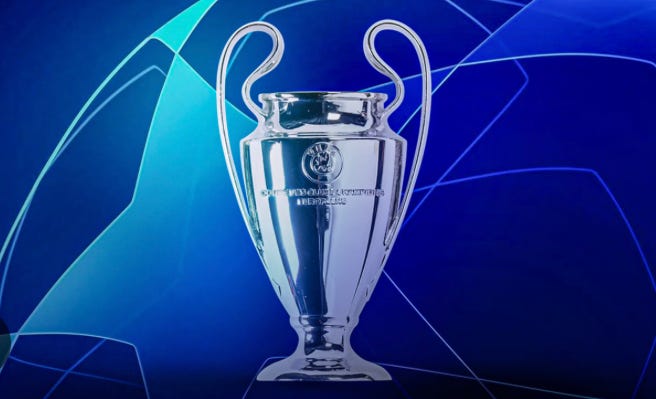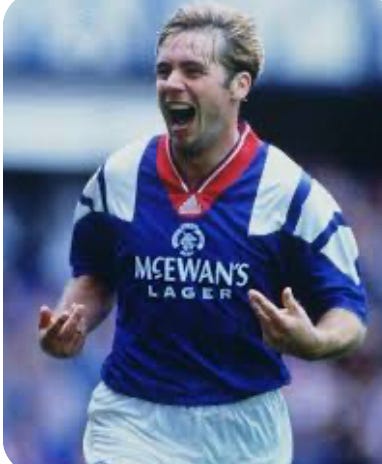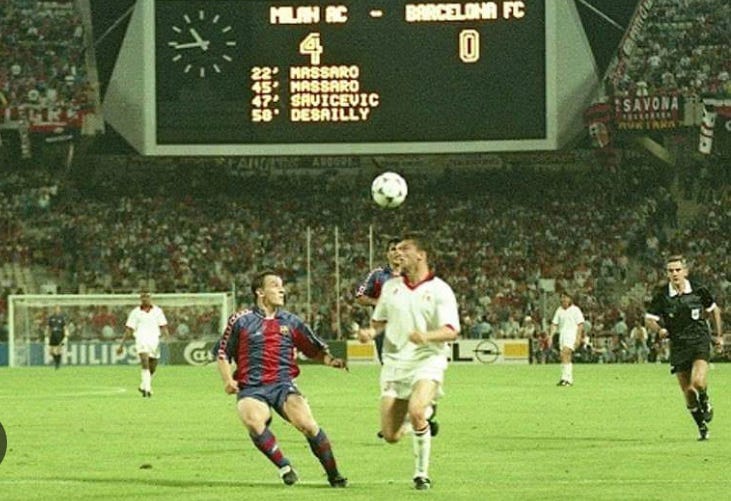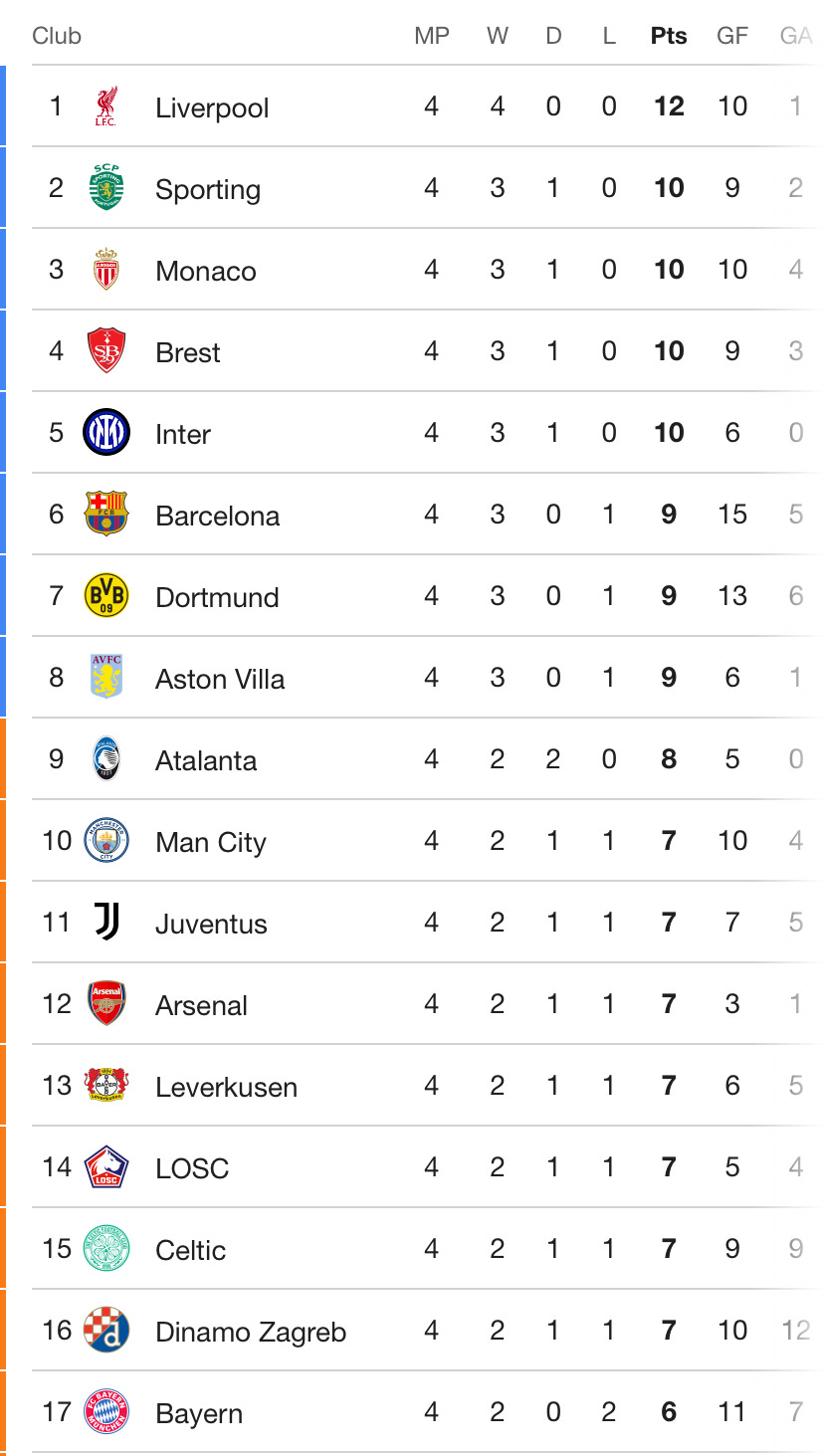The Times They Are A Changing
Tony Britten’s adaptation of Handel’s ‘Zadok the Priest’ is possibly the one piece of music in the world that sparks more memories in me than any other. Whenever I hear it, I am instantly transported back to a variety of moments of wonder, elation and despair. It reminds me of moments of bravery, moments of genius, and numerous moments of incredible never-say-die spirit.
It is a rousing piece thats ebbs and flows mimic what is usually to follow and builds to a memorably epic crescendo. The lyrics are a mixture of French, German and English but, in reality, there are only really two words in the whole thing that are particularly remembered. So well known in fact that those two words are belted out by millions of football fans in stadiums across Europe on a (mostly) fortnightly basis. That is because Britten’s composition also goes by another, far more well-known, title - The Champions League theme tune.
Since its beginning in 1992, the tune has been the backdrop to Europe’s (and many would say the world’s) premier club football competition and has provided a constant in the world of football throughout the incredible number of changes that have taken place in the game over the same time span. This includes changes to the competition itself, probably none more radical than those that have taken place in the revised format that began earlier this season.
Obviously, European competition did not only begin 22 years ago and its previous iteration, the European Cup, dates all the way back to the 1955/56 season, but the revamp of the format (and far wider TV coverage) provided greater exposure and brought the best teams and players on the continent to life in the comfort of our living rooms.
The switch from straight knockout games to an initial group stage (there had actually also been a group stage the season previously, but it hadn't been rebranded as the Champions League yet) meant more games, and more money, for the teams involved as well as a greater opportunity for them to test themselves against the best opposition from other countries and in the beginning that’s exactly what it was as only the actual champions were involved.
My first memory of it actually predates the group matches themselves, back in October of 1992, when the champions of Scotland, Rangers, took on the champions of England, Leeds United in the second knockout round (there were two initial rounds to bring it down to 8 teams before the group stages). It seems to stick in my mind that I was watching round at the house of my friend, who is a big Rangers fan, when the first leg took place at Ibrox, although there is potential that it was actually highlights the following day that we were watching as we were only 7 at the time and I’m not sure I would have been allowed around there until nearly 10 o’clock at night.
Either way, I vividly remember us watching the game and the despair in his face when Gary McAllister powered in a volley from the edge of the box to put Leeds in front in the very first minute. Around 20 minutes later though, that feeling was taken from him by the away goalkeeper, John Lukic, as he spectacularly miscued a punch from a corner and sent the ball across his own goal line to level the game. My friend’s feelings turned even more towards elation when, nearing half-time, Rangers took the lead from yet another set piece when Dave McPherson’s downward header was bundled home by the prolific Ally McCoist.
The match went back and forth in the second half, with chances for both teams, but Rangers held on for the win. For some reason, I didn’t watch the second leg, despite it being on terrestrial television, but was well aware of the result as goals from Mark Hateley and McCoist again carried Rangers through despite a late consolation for the home team by Eric Cantona (just a couple of weeks prior to his transfer to Manchester United).
The team from Scotland progressed to the group stage where they equipped themselves well before finally finishing second in their group, one point behind Marseille who went on to the final to face the mighty AC Milan who had won all of their games in the other group and had conceded only one goal in the process. Suffice to say there was a clear favourite when the final came around.
However, as with many things in football, what transpired didn’t exactly go as expected and the French team won 1-0 thanks to a Basile Boli header to lift their first, and only, European Cup. There remains an asterisk next to this victory due to subsequent findings of match fixing in the French league leading up to the final and allegations of steroid use, but the win has been allowed to stand.
The following years provided numerous memorable moments, started off by Milan’s 4-0 decimation of Johan Cruyff’s Barcelona in one of the most memorable finals ever in 1994. In the build up to the World Cup that year, this is one of the first games that I really remember staying up late to watch at home and I was certainly glad I did to watch Massaro, Boban and Savicevic rip apart the Spaniards.
There are so many stories that have developed in the tournament and the finals over the years that it would be impossible to name them all, but some that have stood out for me include Ricken’s lob; Sheringham and Solskjaer; Shevchenko, Rebrov and the boys from Kiev; Zidane’s Hampden volley; the miracle of Istanbul; the rise of Messi and Ronaldo; Barca’s fight back against PSG; and, unfortunately for me, Bale’s overhead kick. There are also a huge number of other players that I have enjoyed watching including Raul, Buffon, Figo, Maldini, Xavi and, of course, my own Liverpool heroes, as well as more recent stars like Mbappe, Haaland and Vinicius Jr. The beauty is that everyone will have their own moments and players that instantly come to mind.
Over time the popularity of, and money generated by, the competition led to expansion, and soon runners up and even third and fourth placed teams from certain countries were permitted entry and the most well-known format of 32 teams being split into 8 different groups preceding the later knockout rounds was settled on.
What this led to though was less opportunities for smaller nations to have their teams taking part (often they were knocked out in the qualifying rounds) which was then compounded further by the traditional superpowers gaining more funds to strengthen yearly by going deep into the competition. In my mind, it also watered down the prestige of a victory as a team that hadn’t even won their own league could be crowned champions of all of Europe.
There was also a stagnation of games later on in the group stages as often certain teams had already qualified and results became effectively meaningless. Those in the lower places could still fight for the scraps of finishing third and dropping into the Europa League but, in turn, that also lessened the prestige of qualifying for that competition as it was then often won by a team that hadn’t even been in it in the first place.
These are just some of the factors that, alongside the threat of a breakaway European Super League in an attempt to further dominate cash flow in football, meant that it was about time for reform.
What we have ended up with is the new 36 team system where there is only one league table and teams each play 8 games against different opponents of (purported) varying strength. What this should mean, in theory, is that all games should matter right up until the end as there is to fight for in terms of positioning, and, those traditionally less dominant teams should have more chances of doing well as they will have more games against teams of a similar quality and, of course, there will be more glamour matches between the super heavyweights.
There is of course some concern that two of the extra spots actually went to fifth place teams in more dominant countries, rather than spreading the net to further include smaller leagues, and the logistics of fitting in two extra games, and a lot more travel, for every team, but something needed to be done and this is what we have been left with.
Now that we are exactly halfway through the new group stage, it seems like a good time to digest what has taken place so far and whether the changes have had any pronounced effect on outcomes.
Even just a cursory glance at the table shows that things do indeed appear to have changed with Sporting Lisbon, Monaco and Brest sitting second, third and fourth respectively with huge teams like Bayern Munich and Real Madrid down in 17th and 18th and PSG not even currently in the playoffs in 25th.
This may be down to the fixtures that have taken place so far, with some of the bigger teams having some (on paper) easier games to come, but what also seems to have happened is that whereas in the past some teams seemed to resign themselves to defeat against the superpowers and were happy to scrap for points against their other group opponents, in the new format there is something to play for, and far less to lose, in every game. This has led to some big shocks already such as Aston Villa downing Bayern Munich and Sporting Lisbon hammering Manchester City.
It also appears that having more matches between the likes of Madrid, Milan, Barcelona, Bayern et al will lead to the points being more evenly spread and a more even playing field across the board. Whether this continues in the future game weeks remains to be seen but, from my perspective at least, it has been a wholly positive start.
Regardless of what happens, the chimes of ‘Zadok the Priest’ will remain and fans and television companies will continue to invest money in droves in order not to miss something that could go down in history like many of the moments mentioned above.







